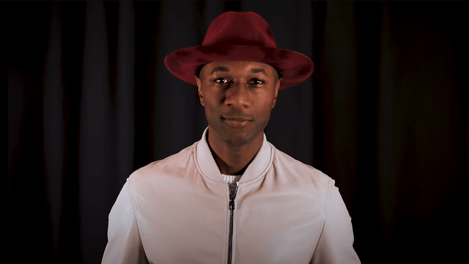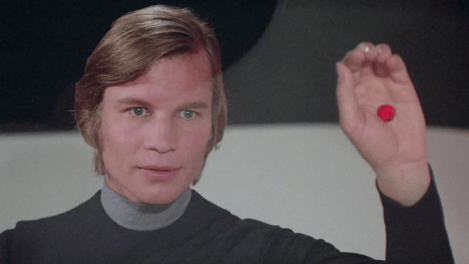
Respeecher’s AI Revives Wilt Chamberlain’s Voice for Showtime’s 'Goliath
Goliath is a made-for-TV trilogy that erupts onto the scene by plunging into Wilt Chamberlain's multi-faceted legacy. Renowned on the court yet puzzlingly misread, the towering figure lives again — thanks to Respeecher’s uncanny voice-cloning AI. Company recreated Wilt’s voice with family consent.
The Project
Chamberlain himself seems to narrate, with his words woven through seldom-seen visuals furnished by his own estate. This compelling mosaic doesn't merely illuminate Chamberlain, it amplifies his colossal reverberations through American society and the realm of athletics. Shattering both records and racial barricades, his story lit up screens in July 2023, via Paramount+ and Showtime.
|
Production Companies |
Distributors |
Critically Acclaimed |
|
Content Cartel | Happy Madison Productions | Heeltap! Entertainment | Religion of Sports | Village Roadshow Television |
Showtime Sports | Paramount+ |
7.2/10 IMDB 100% Rotten Tomatoes |
The Details
When exploring the credits of Goliath on Showtime or Paramount+, one will notice a single intriguing contributor: Respeecher. We were tasked with navigating the labyrinthine task of breathing life back into Wilt Chamberlain's voice, piecing it together from decades-old analog recordings. For Igor Kaniuk, our sonic sculptor armed with cutting-edge Respeecher voice-cloning technology, the challenge resonated like a well-tuned violin. Far from merely meeting expectations, his vocal craftsmanship snagged him an individual salute in this monumental film.
We'd be remiss if we didn’t extol the vocal finesse of Michael Kunda, the origin voice actor whose narrative intonations acted as raw clay to Chamberlain's reconstituted voice. Contrary to fears about AI sidelining artists, Respeecher amplifies, rather than diminishes, creative possibility. Kunda’s timbre became the springboard for Chamberlain’s reanimated utterances.
“The emotion and the timing of everything that’s being spoken is done by a human being,” said Christopher Dillon, Goliath’s co-director. “It’s being done by an actor who we hired to embody Wilt and his emotion. What the A.I. does is change the pitch and tone of that person’s voice so they can sound like Wilt.”
So, how did we do it? The process is deceptively straightforward. Igor trained an AI model using Chamberlain’s vintage audio, meticulously grooming it until it could pass as the bona fide vocal titan. Alongside this, Michael immersed himself in Chamberlain’s vocal nuances, striving for uncanny similarity. The dual vectors of ingenuity converged, enabling Respeecher to transform Kunda's tonality into Chamberlain's, to resounding success.
Check out this Instagram Short from Religion of Sports, where we break down the process:
And lest ethical concerns arise, know that we operate under the aegis of total legal autonomy. Chamberlain's family was kind enough to grant us permission to restore his illustrious voice from the shadows of yesteryears.
The Release
Goliath's debut knocked it out of the park, winning adulation from critics and sports aficionados alike.
As for the vocal alchemy's fidelity, we cede the final say to you, our audience. Intriguingly, those who personally knew Chamberlain attest they couldn't discern the synthetic voice from the authentic one.
We're keenly aware that public sentiment on AI's role in restoring historical voices can provoke polarization — think of the 2021 Anthony Bourdain film uproar (the family never consented to the use of Bourdain’s voice). Yet, we're staunch advocates for the transformative power of AI. Granted proper familial consent, respect for intellectual property, and a reverential approach to an individual's legacy, AI can be a potent tool. In the right hands, it can catalyze fresh engagement with seminal figures who've shaped our world.
FAQ
AI voice cloning recreates authentic voices for sports documentaries by analyzing historical recordings and synthesizing accurate, lifelike speech that matches the original tone and pitch.
Respeecher’s cutting-edge AI technology combines historical audio with voice actor performances to create lifelike, ethical recreations of legendary voices for documentaries and films.
Family consent ensures ethical use of AI voice recreation, respecting intellectual property and personal legacies while delivering authentic voices in media productions.
Glossary
Voice cloning
Using AI technology to replicate a person’s unique vocal attributes, enabling lifelike voice recreation for historical or creative purposes.
Synthetic voices
AI-generated voices used in documentaries, films, and media production to replicate or create authentic-sounding speech.
Historical voice restoration
Recreating voices of iconic figures from the past using AI-powered voice transformation and archival recordings.
Ethical AI use
The responsible and respectful application of AI technology, particularly in cases involving intellectual property and personal legacies.
Sports documentaries
Films or series that explore the stories and legacies of athletes, often enriched with AI voices to bring historical figures to life.
Reviving Legendary Voices:
AI in Sports Documentaries
The integration of AI voice technology is transforming sports documentaries, enabling the recreation of iconic voices such as Wilt Chamberlain’s in Goliath. By combining synthetic voices with archival recordings, these projects achieve a compelling level of authenticity. Respeecher’s voice cloning technology plays a pivotal role in ensuring accurate and ethical recreations, aligning with family consent and collaboration with skilled voice actors. This approach not only respects the legacy of historical figures but also enriches storytelling for modern audiences.
-
Authentic Voice Recreation
AI voice recreation allows producers to replicate the voices of historical sports legends with remarkable accuracy. For documentaries like Goliath, this means viewers can experience a direct connection to figures like Wilt Chamberlain, hearing his voice as if he were narrating his own story. This level of authenticity creates a deeper emotional resonance with the audience and ensures that the legacy of iconic athletes is preserved in its truest form.
-
Ethical Applications in Documentaries
The ethical use of AI-powered voice transformation is a cornerstone of Respeecher’s work. By seeking family consent and respecting intellectual property rights, projects like Goliath ensure that the voices of historical figures are treated with dignity and care. This collaborative approach not only honors the individual’s legacy but also sets a standard for responsible AI use in media production. Such practices prevent misuse and build trust with audiences and stakeholders alike.
-
Technology and Human Collaboration
AI voice cloning does not replace human creativity; instead, it amplifies it. Skilled voice actors, like Michael Kunda in Goliath, provide the emotional foundation for AI to build upon. The AI refines their performances, matching tone and pitch to replicate historical voices like Wilt Chamberlain’s. This synergy between human talent and AI precision results in a truly lifelike recreation, making documentaries both captivating and credible.







